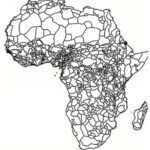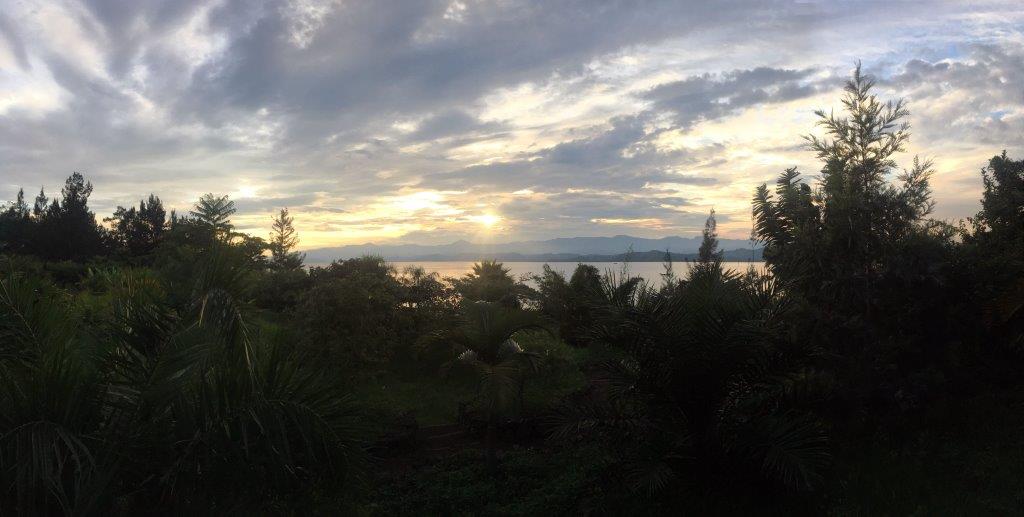Aurélien Kambala in the north-eastern Congolese city of Butembo is preparing himself for his role as an election observer on Sunday*. The father puts his work aside when Moise Paluki comes by to tell his story. He wants to embrace Moise Paluki, but an Ebola epidemic in the region forbids such compassion. Consolation is no longer allowed. His visitor tells him how militia fighters killed his eldest son last week and set fire to his truck loaded with peanuts. “I have nothing left, how do I continue with my life”, laments Paluki, “and imagine, I do not even know who the perpetrators are”.
The inhabitants in the north-eastern region are desperate. For years they have suffered the terror of numerous armed groups. On top of that came Ebola. The violence in this wooded agricultural region began in 2014 and already led to 2000 civilian deaths and 200,000 more displaced. Who the perpetrators are and what motivates them is unclear. The UN soldiers of a peacekeeping force also often wonder who their enemy is, but they do observe the connections of the militias with politicians. Using the disorder, neighbouring countries and Congolese politicians, smugglers and tribal chiefs set up the fighting groups for their own interests. In fertile Congo with its numerous mineral resources, war is more profitable than peace – at least for a small group of profiteers. Congo is a place to plunder, since the Belgian king Leopold to Mobutu and then from Mobutu to the Kabila’s.
“Kill me, I do not care anymore,” Moise Paluki mourns as he raises his hands to an imaginary attacker, “but tell me who you are, and why you want to kill me!”
The chaos rages throughout Eastern Congo, as well as in the central region of Kasai. Virtually nowhere in Africa is the gap between citizens and rulers so distressing.
Hippos and gorillas
The beauty of Eastern Congo is overwhelming. The series of lakes, from Lake Albert near South Sudan to the Lake Mweru near Zambia, have an incredible lush nature, with misty valleys, threatening volcanoes and raging rivers. The Congo River rises here, the most powerful in the world. It makes its way through the forests to the capital of Kinshasa, 1500 km westward. There are gorillas in the mountains and hippos in the lakes. But the terror creates bloody traces in the pretty landscape. Over 4 million Congolese were displaced in recent years. Armed men have been raping, beheading and robbing the population for over a quarter of a century. As if there is a curse on this land. “Survivors of the attack on my truck recognized some government soldiers among the perpetrators”, explains Moise Paluki to the father. “Aha”, he mumbles, “that corresponds with findings of my field research”.
According to research by Human Rights Watch In Eastern Congo 140 militias operate -ranging from gangs of forty to two thousand. Some defend their own (tribal) community, others are distinguished by their brutal behavior, such as the group led by (now arrested) commander Cheka Cheka (cheka means laughter in Kishwahili, apparently he smiled when he cut the throat of his victims).
In the past quarter of a century, the government lacked the will and power to defeat them. Sometimes individual army leaders make agreements with the militias to corporate in extracting raw materials. Sometimes the government army absorbs the fighters, while maintaining their combat units. In this way members of militias supported by Rwanda, Uganda and Burundi got strong influence in the Congolese government forces. In their new government uniforms, they continue their struggle for Congo’s riches.
Eastern Congo was already unstable under the dictator Mobutu Sese Seko (1965-1997) but the scale of human rights violations now has its origin in the highlands of the neighbouring countries. After the takeover by Yoweri Museveni in neighbouring Uganda in 1986, his Muslim opponents descended to the north-eastern region of Congo. Then, further south, after the genocide in 1994, hundreds of thousands of Rwandans entered the country.
In 1997 the armies of Rwanda and Uganda used the east as a springboard for their invasion in Congo, to overthrow Mobutu and in the process control gold, diamond and cobalt mining. An estimated four million Congolese died because of that interference by Uganda and Rwanda. In the power vacuum a system of plunder arose with remote controlled militias as the perpetrators.
In the middle of this spider web of intrigues, the failing government blames Muslim extremists of the ADF (Allied Democratic Forces) and compares it with Al-Shabaab in Somalia. That seems like an excuse, the influence of Muslims is small. Omar Aboud, head of the UN’s field office in Beni, just north of Butembo, undermines the government’s argument: “These are not militant Muslim fighters. This is not about strong Islamic groups which control areas “.
Father Aurélien emphasizes a conflict between the Nande, the largest indigenous population group in the region and the Banyarwanda: Rwandans who migrated to the region earlier. “The majority of the victims is Nande. The attackers often speak Rwandan. They steal pigs and are often drunk. They want to drive us away from our land.”
Leopard skin
In front of a compound just outside Beni, a scarecrow dressed in military uniform must protect the inhabitants, but most people in the neighbourhood prefer to sleep in the city centre at night. Almost every week shots can be heard outside Beni on the way to the airport and sometimes militia fighters even come to the heart of the city.
Some Congolese are looking for answers in their history. A hundred years ago, tribal elders sentenced people to death by having them murdered by just initiated youngsters dressed in leopard skin. According to tradition, these ‘human leopards’ remained unrecognizable. Because they acted on behalf of the tribal authority, nobody even dared to guess their identity.
Father Aurélien points to more worldly matters. “We live under Kabila in a dictatorship and therefore cannot face the cause of the violence”.
Le soldat du peuple
The election campaigns were a competition between politicians who enriched themselves in a kleptocracy. Most of the Congolese want to get rid of the robber gang around President Joseph Kabila and his crown prince in the elections, Emmanuel Ramazani Shadary. The government manipulated the election process with intimidation and violence and no one expects a fair outcome on the voting day.
The self-righteous opposition politicians failed to make a united front. Divided, they entered the elections. Opposition candidate Martin Fayulu used for his campaigns money from the business families of Moise Katumbi and Jean Pierre Bemba and the other opposition candidate Felix Tshisekedi could count on a well-financed party apparatus from his father Etienne, who died last year.
Yet there is also hope in Congo. “The opposition candidate Martin Fayulu inspires the Congolese, he is the least corrupted of the mediocre political class,” says Father Aurélien.
In the campaigns of the past few weeks, the authorities worked against “the soldier of the people”, as Fayulu calls himself. They barricaded a runway so that his plane could not land. They sent trained troublemakers to his meetings or banned them. Sometimes the police shot at his supporters. Government candidate Shadary, on the other hand, was given full freedom and support.
The fact that elections would take place at all – after two years of opposition by Kabila – Congolese consider a victory over their unpopular president. It led to joy and music in the country – Congolese rumba music makes everyone dance from young to old.
Young people walked at the beginning of December in droves to a rally of the opposition candidate Fayulu in Goma. Against the background of a majestic volcano on a lava-covered field, he climbed the stage as the crowd swung with the hips and shook the shoulders. “It is symbolic that I started my campaigning here,” Fayulu said, “because you in the East have paid a high price for the Kabila regime. Here you do not have the rule of law. How can our country be so rich and the population so poor? Congo must be resurrected”.
Lucha
And this is the best news from Congo: Citizens’ groups take matters into their own hands against the corrupted politicians. Fayulu won their sympathy when he participated in demonstrations organized by the Catholic Church against the postponement of elections by Kabila.
After the shrieking “Kabila fuck off”, Fayulu exhorted the audience to a minute’s silence in memory of Luc Nkulula of the civil movement Lucha, which fights against kleptocracy. Earlier this year, unknow assailants threw a fire bomb at his home in Goma, killing him.
One must have courage in Congo to be an activist. Lucha tries to make residents aware of their rights and to act for social improvement. Where a politician in Goma campaigned by offering free transport to commuters for a week, Lucha activists voluntarily clean neighbourhoods every Saturday. The youthful Espoir Ngalukiye was a soul mate of the murdered Luc Nkulula. “Since his murder our family members fear for their safety. But we will continue”, the activist says. The movement is not part of the patronage system by the elite – and therefore constitutes a threat to the government. In response, the government infiltrates the movement and intimidates it by bribery, murder and kidnapping. That is why it is already a miracle that Lucha still exists in the corrupted Congo. Espoir – whose name means ‘hope’ – symbolizes a new, digital generation. He resolutely says: “We are going to liberate Congo from despair.”
* Earlier this week the elections in Beni and Butembo were cancelled, officially because of ebola. That means that 1.2 million of the 40 million people nationwide who registered to vote cast their vote until March, despite that the election results are supposed to be out by the 15th of January
This article was first published in NRC Handelsbald on 21-12-2018
Photo:
-1 Lake Kivu near Goma(Koert Lindijer)
-2 Ebola transit centre in Beni(Johannes Dieterich)
-3 Beni(Johannes Dieterich)
-4 Rutshuri(Koert Lindijer)

